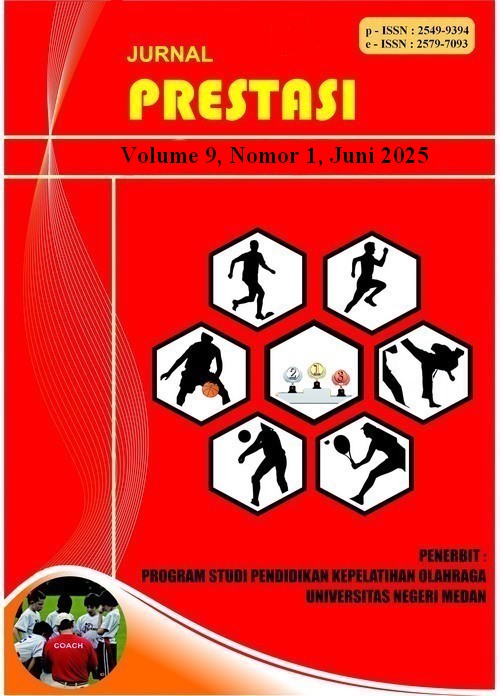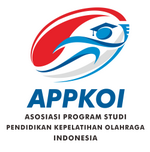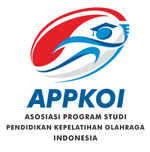SEPAK BOLA SEBAGAI SARANA PEMBENTUKAN KEPRIBADIAN DAN INTERAKSI SOSIAL ANAK-ANAK
DOI:
https://doi.org/10.24114/jp.v9i1.66313Keywords:
Kepribadian anak, Interaksi sosial, keterampilan sosial, Sepak BolaAbstract
Penelitian ini menginvestigasi peran sepak bola dalam pembentukan kepribadian dan interaksi sosial anak-anak dalam berbagai konteks budaya dan sosial. Tujuan utama penelitian adalah untuk memberikan pemahaman mendalam tentang bagaimana aktivitas sepak bola mempengaruhi perkembangan sosial anak-anak dan implikasinya dalam konteks pendidikan dan pengembangan anak. Menggunakan pendekatan studi kasus kualitatif, penelitian ini mengeksplorasi fenomena ini melalui partisipasi aktif anak-anak dalam klub atau program sepak bola di sekolah. Partisipan terdiri dari anak-anak berusia 8 hingga 12 tahun yang telah terlibat dalam sepak bola selama minimal satu tahun. Data dikumpulkan melalui wawancara mendalam, observasi partisipan selama latihan dan pertandingan, diskusi kelompok terfokus, serta dokumentasi lapangan. Analisis data menggunakan pendekatan koding tematik dan analisis naratif untuk mengidentifikasi perubahan kepribadian, peningkatan interaksi sosial, dan pengembangan keterampilan sosial melalui aktivitas sepak bola. Hasil penelitian menunjukkan bahwa bermain sepak bola memberikan kontribusi signifikan terhadap pengembangan keterampilan sosial anak-anak, seperti kerja tim, komunikasi efektif, dan manajemen konflik positif. Interaksi dalam tim juga memperkuat hubungan sosial dengan teman sebaya, yang berkontribusi pada pembentukan identitas dan rasa harga diri mereka. Selain itu, sepak bola sebagai alat integrasi sosial memungkinkan anak-anak untuk memahami dan menghargai perbedaan budaya dan norma sosial, sambil memperkuat identitas mereka melalui peran dalam tim. Sepak bola bukan hanya kegiatan fisik semata, tetapi juga merupakan sarana yang efektif untuk pengembangan keterampilan sosial, emosional, dan integrasi budaya pada anak-anak. Penelitian ini menyoroti pentingnya mendukung partisipasi anak-anak dalam aktivitas sepak bola sebagai bagian dari pendekatan holistik dalam pembangunan karakter dan kesiapan sosial mereka.References
Arnott, L. (2020). An ecological exploration of young children’s digital play: Framing children’s social experiences with technologies in early childhood. In Digital Play and Technologies in the Early Years (pp. 49–66). Routledge.
Bailey, R., Armour, K., Kirk, D., Jess, M., Pickup, I., Sandford, R., & Education, B. P. (2009). The educational benefits claimed for physical education and school sport: an academic review. Research Papers in Education, 24(1), 1–27.
Böhm, R., Rusch, H., & Baron, J. (2020). The psychology of intergroup conflict: A review of theories and measures. Journal of Economic Behavior & Organization, 178, 947–962.
Caputo, V. (2022). Anthropology’s silent ‘others’: A consideration of some conceptual and methodological issues for the study of youth and children’s cultures. In Youth cultures (pp. 19–42). Routledge.
Carbon, C.-C. (2020). Wearing face masks strongly confuses counterparts in reading emotions. Frontiers in Psychology, 11, 566886.
Champ, F., Ronkainen, N., Tod, D., Eubank, A., & Littlewood, M. (2021). A tale of three seasons: A cultural sport psychology and gender performativity approach to practitioner identity and development in professional football. Qualitative Research in Sport, Exercise and Health, 13(5), 847–863.
Duncan, M. J., Weldon, A., Barnett, L. M., & Lander, N. (2022). Perceptions and practices of fundamental movement skills in grassroots soccer coaches. International Journal of Sports Science & Coaching, 17(4), 761–771.
Dyson, B., Howley, D., & Shen, Y. (2021). ‘Being a team, working together, and being kind’: Primary students’ perspectives of cooperative learning’s contribution to their social and emotional learning. Physical Education and Sport Pedagogy, 26(2), 137–154.
Ekholm, D., & Dahlstedt, M. (2020). A model of discipline: the rule (s) of Midnight Football and the production of order in subjects and society. Journal of Sport and Social Issues, 44(5), 450–475.
Erikstad, M. K., Johansen, B. T., Johnsen, M., Haugen, T., & Côté, J. (2021). “As many as possible for as long as possible”—A case study of a soccer team that fosters multiple outcomes. The Sport Psychologist, 35(2), 131–141.
Fader, N., Legg, E., & Ross, A. (2020). Finding a Sense of Community in Youth Soccer: A Composite Vignette of the Refugee Experience. Journal of Park & Recreation Administration, 38(2).
Fairlamb, S. (2022). We need to talk about self-esteem: The effect of contingent self-worth on student achievement and well-being. Scholarship of Teaching and Learning in Psychology, 8(1), 45.
Fazliddinov, F. (2021). Psychological impact of football games to the formation of individuality of the student. Buxoro Davlat Pedagogika Instituti Jurnali, 1(1).
Formenti, D., Rossi, A., Bongiovanni, T., Campa, F., Cavaggioni, L., Alberti, G., Longo, S., & Trecroci, A. (2021). Effects of non-sport-specific versus sport-specific training on physical performance and perceptual response in young football players. International Journal of Environmental Research and Public Health, 18(4), 1962.
Galan, Y., Yarmak, O., Andrieieva, O., Yuriy, M., Sukhomlynov, R., Zoriy, Y., Koshura, A., Ivanchuk, M., Vaskan, I., & Bohdanyuk, A. (2021). Impact of football clubs on the recreational activities of preschoolers. Journal of Physical Education and Sport, 21(2), 803–812.
García-Hermoso, A., Alonso-Martínez, A. M., Ramírez-Vélez, R., Pérez-Sousa, M. Á., Ramírez-Campillo, R., & Izquierdo, M. (2020). Association of physical education with improvement of health-related physical fitness outcomes and fundamental motor skills among youths: a systematic review and meta-analysis. JAMA Pediatrics, 174(6), e200223–e200223.
Hardman, K. (2008). Physical education in schools: a global perspective. Kinesiology, 40(1).
Haslam, S. A., Boen, F., & Fransen, K. (2020). The new psychology of sport and exercise: The social identity approach.
Higham, A. J., Newman, J. A., Stone, J. A., & Rumbold, J. L. (2021). Coaches’ experiences of morality in English professional football environments: Recommendations for creating a moral atmosphere. International Sport Coaching Journal, 9(2), 211–221.
Howard, M. C., & Gutworth, M. B. (2020). A meta-analysis of virtual reality training programs for social skill development. Computers & Education, 144, 103707.
Imam, H., & Zaheer, M. K. (2021). Shared leadership and project success: The roles of knowledge sharing, cohesion and trust in the team. International Journal of Project Management, 39(5), 463–473.
Jakobsson, B. T., & Lundvall, S. (2021). Learn, have fun and be healthy! An interview study of swedish teenagers’ views of participation in club sport. International Journal of Environmental Research and Public Health, 18(13), 6852.
Killen, M., & Dahl, A. (2021). Moral reasoning enables developmental and societal change. Perspectives on Psychological Science, 16(6), 1209–1225.
Laakso, T., Davids, K., Luhtanen, P., Liukkonen, J., & Travassos, B. (2022). How football team composition constrains emergent individual and collective tactical behaviours: Effects of player roles in creating different landscapes for shared affordances in small-sided and conditioned games. International Journal of Sports Science & Coaching, 17(2), 346–354.
Li, J., & Shao, W. (2022). Influence of sports activities on prosocial behavior of children and adolescents: A systematic literature review. International Journal of Environmental Research and Public Health, 19(11), 6484.
McDonald, B., Spaaij, R., & Dukic, D. (2022). Moments of social inclusion: Asylum seekers, football and solidarity. In The Potential of Community Sport for Social Inclusion (pp. 53–67). Routledge.
McGlynn, J., Boneau, R. D., & Richardson, B. K. (2020). “It might also be good for your brain”: Cognitive and social benefits that motivate parents to permit youth tackle football. Journal of Sport and Social Issues, 44(3), 261–282.
Merino Orozco, A. (2021). Discipline (and reversibility) in the training space of school football: a case study. Revista Innova Educación, 3(2), 301–320.
Mitchell, P. (2021). Acquiring a conception of mind: A review of psychological research and theory. Psychology Press.
Piñeiro-Cossio, J., Fernández-Martínez, A., Nuviala, A., & Pérez-Ordás, R. (2021). Psychological wellbeing in physical education and school sports: A systematic review. International Journal of Environmental Research and Public Health, 18(3), 864.
Reverberi, E., D’Angelo, C., Littlewood, M. A., & Gozzoli, C. F. (2020). Youth football players’ psychological well-being: the key role of relationships. Frontiers in Psychology, 11, 567776.
Sagone, E., De Caroli, M. E., Falanga, R., & Indiana, M. L. (2020). Resilience and perceived self-efficacy in life skills from early to late adolescence. International Journal of Adolescence and Youth, 25(1), 882–890.
Shalar, O., Strykalenko, Y., Huzar, V., Voloshinov, S., Homenko, V., & Svirida, V. (2021). Physical fitness assessment of young football players using an integrated approach.
Silva, R., Farias, C., & Mesquita, I. (2021). Cooperative learning contribution to student social learning and active role in the class. Sustainability, 13(15), 8644.
Sulistiyono, S., Akhiruyanto, A., Primasoni, N., Arjuna, F., Santoso, N., & Yudhistira, D. (2021). The effect of 10 weeks game experience learning (gel) based training on teamwork, respect attitude, skill and physical ability in young football players. Physical Education Theory and Methodology, 21(2), 173–179.
Szalánczi, Z., Kovács, B., & Bácsné Bába, É. (2020). Socializing effect of child soccer players on their parents.
Teoldo, I., Guilherme, J., & Garganta, J. (2021). Football intelligence: Training and tactics for soccer success. Routledge.
Thomas, R. (2020). From social activism to active socialization: The evolution of football ideology in community‐owned football clubs. Strategic Change, 29(4), 459–470.
Uehara, L., Falcous, M., Button, C., Davids, K., Araújo, D., de Paula, A. R., & Saunders, J. (2021). The poor “wealth” of Brazilian football: How poverty may shape skill and expertise of players. Frontiers in Sports and Active Living, 3, 635241.
Valente, S., & Lourenço, A. A. (2020). Conflict in the classroom: How teachers’ emotional intelligence influences conflict management. Frontiers in Education, 5, 5.
Vaughan, J., Mallett, C. J., Potrac, P., Woods, C., O’Sullivan, M., & Davids, K. (2022). Social and cultural constraints on football player development in Stockholm: influencing skill, learning, and wellbeing. Frontiers in Sports and Active Living, 4, 832111.
Downloads
Published
Issue
Section
License
Copyright (c) 2025 Maylana Sudharma, Dede Nurodin

This work is licensed under a Creative Commons Attribution-ShareAlike 4.0 International License.
Authors who publish with this journal agree to the following terms:
- Authors retain copyright and grant the journal right of first publication with the work simultaneously licensed under a Creative Commons Attribution License that allows others to share the work with an acknowledgment of the work's authorship and initial publication in this journal.
- Authors are able to enter into separate, additional contractual arrangements for the non-exclusive distribution of the journal's published version of the work (e.g., post it to an institutional repository or publish it in a book), with an acknowledgment of its initial publication in this journal.
- Authors are permitted and encouraged to post their work online (e.g., in institutional repositories or on their website) prior to and during the submission process, as it can lead to productive exchanges, as well as earlier and greater citation of published work (See The Effect of Open Access).
- This work is licensed under a Creative Commons Attribution-ShareAlike 4.0 International License.























